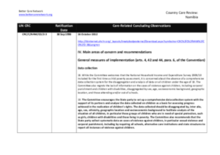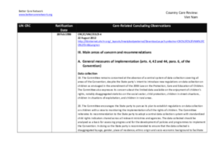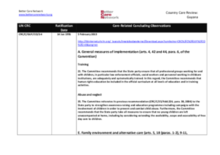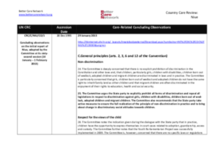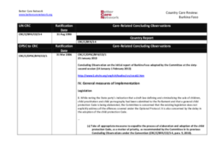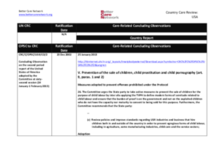Displaying 511 - 520 of 625
This country care review includes the Concluding Observations for the Committee on the Rights of the Child adopted as part of its examination of Namibia’s combined second and third periodic reports at the 61th Session of the Committee held between 17 September and 5 October 2012, as well as other care-related concluding observations, ratification dates, and links to the Universal Periodic Review and Hague Intercountry Adoption Country Profile.
This country care review includes the Concluding Observations for the Committee on the Rights of the Child adopted as part of its examination of Vietnam’s combined third and fourth periodic reports at the 60th Session of the Committee held between 9 May and 15 June 2012. The Committee’s recommendations on the issue of Family Environment and Alternative Care as well as other care relevant issues are highlighted.
This country care review includes the care related Concluding Observations adopted by the Committee on the Rights of the Child as part of its examination during the sixty-second session (14 January- 1 February 2013) of Guyana’s combined second, third and fourth period reports to the Convention on the Rights of the Child, as well as other care-related concluding observations, ratification dates, and links to the Universal Periodic Review and Hague Intercountry Adoption Country Profile.
This country care review includes the care related Concluding Observations adopted by the Committee on the Rights of the Child as part of its examination during the sixty-second session (14 January- 1 February 2013) of Niue’s initial report to the Convention on the Rights of the Child, as well as other care-related concluding observations, ratification dates, and links to the Universal Periodic Review and Hague Intercountry Adoption Country Profile.
Care related Concluding Observations adopted by the Committee on the Rights of the Child on the initial report of Burkina Faso under the Optional Protocol to the Convention on the Rights of the Child on the sale of children, child prostitution and child pornography.
This country care review includes the care related Concluding Observations adopted by the Committee on the Rights of the Child as part of its examination of the United States of America’ second periodic report under the Optional Protocol to the Convention on the Rights of the Child on the sale of children, child prostitution and child pornography, as well as other care-related concluding observations, ratification dates, and links to the Universal Periodic Review and Hague Intercountry Adoption Country Profile.
This document presents the data on intercountry adoptions to the United States in the Fiscal Year 2012, as per the U.S. State Department.
This paper discusses the challenges of reforming the child welfare and protection systems in Hungary and Romania -two countries in transition from socialism to capitalism- and the impact on children, young people, families, and professionals. The focus is on the efforts made to deinstitutionalise children from large institutions, develop local prevention services, and develop alternatives to institutional care.
This report and research conducted by SOS Children’s Villages reviews alternative care arrangements in Tanzania.
Adoptive families are now using the Internet to give their unwanted adopted children over to complete strangers, some of whom are traffickers, pedophiles, child pornographers, or worse. This practice is known as private rehoming.

